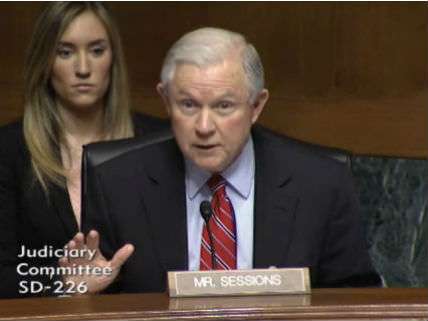6 Misconceptions Underlying Opposition to Sentencing Reform
Is reducing prison terms reckless in light of drug and crime trends?

"With crime rising in America and police increasingly under siege," writes Hudson Institute senior fellow Jeffrey Anderson at The Weekly Standard, "many Senate Republicans have decided it's a good time to liberalize federal sentencing policies." Anderson disagrees. He approvingly quotes Sen. Jeff Sessions (R-Ala.), who complains that bipartisan legislation backed by the chairmen of the Senate and House judiciary committees would "cut prison sentences for drug traffickers and even other violent criminals, including those currently in federal prisons." Sessions, a former U.S. attorney, deems that plainly reckless at a time when "drug use and overdoses are occurring and dramatically increasing," when "violent crime and murders have increased across the country at almost alarming rates in some areas," and when "law enforcement officers across our country have been shot at, killed without provocation, too often simply because they wear a badge." Anderson, still quoting Sessions, closes with the late criminologist James Q. Wilson's observation that "a high risk of punishment reduces crime." Anderson adds that "Republicans used to understand that."
Anderson, with Sessions' help, manages to pack at least half a dozen serious misconceptions into a 375-word post. Let's consider them one at a time.
Is "crime rising in America"? As Jesse Walker noted here last month, the latest FBI numbers show that violent and property crime both fell last year, continuing a "long decline" that began in the mid-1990s. Although some American cities have seen spikes in violent crime this year, it is not clear whether they represent a nationwide increase or, if so, whether that increase represents a reversal of recent trends or a blip.
Are police "increasingly under siege"? Last month my former Reason colleague Radley Balko, who writes about criminal justice for The Washington Post, reported that "2015 is on pace to see 35 felonious killings of police officers" and that "if that pace holds, this year would end with the second lowest number of murdered cops in decades." As Jesse Walker pointed out here, such numbers have never deterred law-and-order types who propagate "the eternally recurring legend of a 'war on cops.'"
Are drug traffickers "violent criminals"? Some are, but there is a clear distinction between stabbing or shooting someone and engaging in consensual transactions that Congress has arbitrarily decided to prohibit. Under current law, doing the latter is enough to trigger mandatory minimum sentences ranging from five years to life. By pretending there is no difference between violent predators and nonviolent drug offenders, opponents of reform make a hash out of any effort to focus criminal justice resources on the lawbreakers who pose the biggest threat to public safety.
Are "drug use and drug overdoses…dramatically rising"? Heroin use and fatal "overdoses" (which usually involve a mixture of heroin with other depressants) have been rising in recent years, but consumption of methamphetamine and cocaine (including crack) has been falling or flat. Over the short term, the main beneficiaries of the bills that Anderson and Sessions oppose will be crack offenders serving sentences that nearly everyone (including Sessions) now agrees are too long. It is hard to see how letting these prisoners out a bit sooner can be expected to have any impact at all on heroin consumption, even assuming that locking up drug dealers reduces drug use.
Does locking up drug dealers reduce drug use? James Q. Wilson, the same criminologist whose lessons Anderson thinks Republicans need to relearn, observed that prison terms for drug dealers "do not have the same incapacitative effect as sentences for robbery," since "a drug dealer sent away is replaced by a new one because an opportunity has opened up." More fundamentally, it is the demand for drugs (combined with prohibition) that creates the black market, not the other way around.
Does shortening sentences reduce the "risk of punishment"? Clearly not. The risk of punishment can remain exactly the same (or increase) while the severity of punishment is reduced. Research suggests that deterrence depends more on the former than the latter.
If this is the best that opponents of sentencing reform can do, the chances that the current Congress will pass decent legislation look pretty good.
[Thanks to CharlesWT for the tip.]
